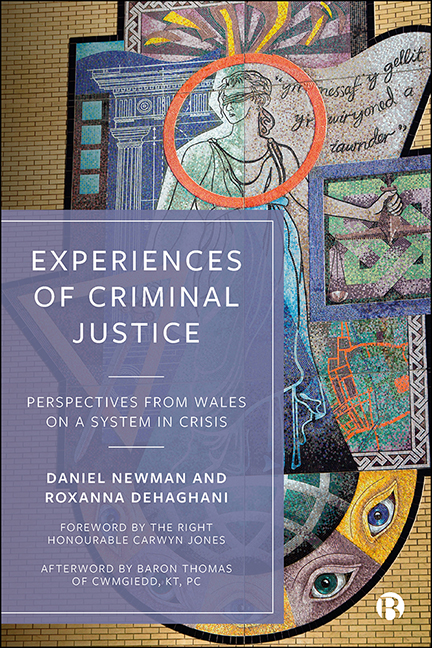Book contents
- Frontmatter
- Contents
- List of Figures and Tables
- Foreword
- Acknowledgements
- 1 Why Wales?
- 2 A System in Crisis
- 3 The People and Their Experiences
- 4 Criminal Justice in Its Place
- 5 Pressures of Practice
- 6 Criminal Justice Relationships
- 7 Navigating the Criminal Justice System
- 8 Doing Criminal Justice Differently
- Afterword
- References
- Index
6 - Criminal Justice Relationships
Published online by Cambridge University Press: 15 September 2022
- Frontmatter
- Contents
- List of Figures and Tables
- Foreword
- Acknowledgements
- 1 Why Wales?
- 2 A System in Crisis
- 3 The People and Their Experiences
- 4 Criminal Justice in Its Place
- 5 Pressures of Practice
- 6 Criminal Justice Relationships
- 7 Navigating the Criminal Justice System
- 8 Doing Criminal Justice Differently
- Afterword
- References
- Index
Summary
Introduction
In the previous chapter, we considered some of the pressures that criminal justice practitioners faced and the resultant negative impact on the criminal process. The chapter examined problems stemming from inadequate legal aid and the way that this undermined criminal legal practice. In this chapter, we consider how those pressures impact upon relationships – operating within the parameters imposed by underfunding – between different parties in the criminal process.
Within this chapter we examine the experiences of ‘others’ in the criminal process, specifically those accused of committing criminal offences, interrogating how various parties within the criminal process understood their own experiences and those of others. The roles of actors within the criminal justice system may have a bearing on the values within the system (McConville and Marsh, 2014). In particular, the shift between ‘due process’ to ‘criminal control’ has signalled an anti-accused ideology with increasing police corruption, decreasing evidential standards, lawyers’ antagonism towards clients, harsher sentences, and inducements for guilty pleas (McConville and Marsh, 2014). Indeed, previous research has pointed towards the need to investigate interactions between key actors in a holistic manner (Newman and Ugwudike, 2013). Through examining interactions and relationships, we can understand how the process is experienced and, crucially, how it operates.
A prominent subject emerging from our research is how important it is for good relations to be built between various actors. While individuals and parties to the process may hold different worldviews and possess varying responsibilities, it was evident that essential to the functioning of the criminal justice system was the establishment of some common ground. Yet, some differences – such as the perspective of the arresting police officer and the suspect protesting their innocence – may be irreconcilable and, in some instances, we may prefer there to be greater distinctions between, for example, the views of prosecution and defence, particularly on matters such as negotiated settlement. Of particular concern is the danger of the courtroom culture and how it may cause a shift in the defence lawyer's mindset away from the needs of the accused person (their client) and towards the needs of the prosecution and the state they represent (Heumann, 1978), thus working against ‘zealous advocacy’ (Smith, 2013).
- Type
- Chapter
- Information
- Experiences of Criminal JusticePerspectives from Wales on a System in Crisis, pp. 141 - 171Publisher: Bristol University PressPrint publication year: 2022



